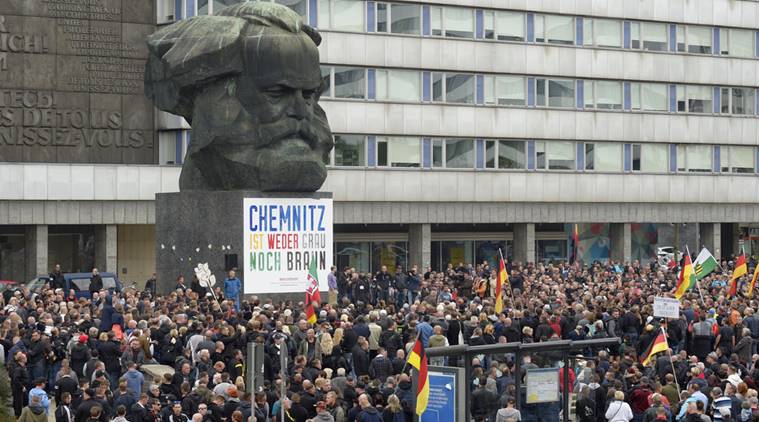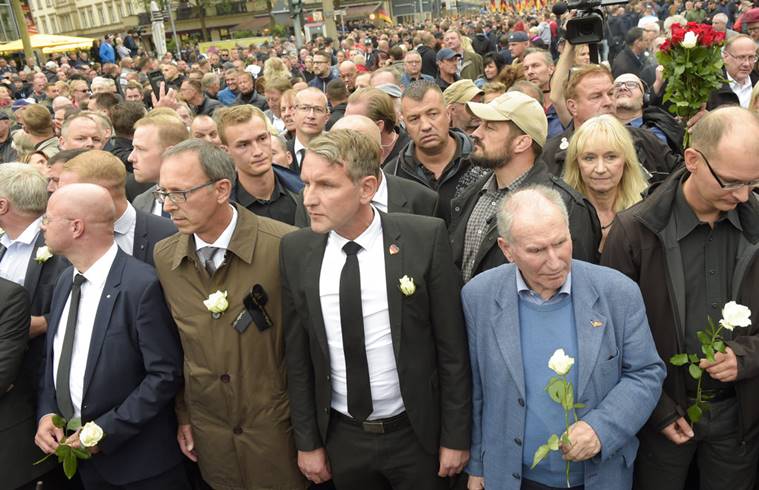Germany: Police halt anti-immigrant march envisioned as far-right springboard
The protests were sparked by a fatal stabbing of a 35-year-old German man, Daniel Hillig. Two asylum-seekers, a 22-year-old Iraqi and a 23-year-old Syrian, have been arrested on suspicion of manslaughter.

Demonstrators hold photos of people they claim have been killed by migrants during a demonstration in Chemnitz, eastern Germany. (AP)
Police in eastern Germany brought an early close on Saturday to an anti-migrant march that far-right activists hoped would launch a nationwide movement to challenge the political establishment, with the fatal stabbing of a German citizen as the catalyst.
A trio of nationalist groups held separate rallies in the city of Chemnitz over the August 26 slaying for which a Syrian and an Iraqi citizen were arrested. The two largest groups also organised their first joint march, a display of unity meant to build on other protests since the killing and a potent force to take hold.
1m 39s

The drag queens spoofing Germany's far-right party
As the Germany's election approaches, posters for a new "party" are popping up around the country.
Saxony state police cited security concerns for halting the march after more than an hour, producing screams and whistles from demonstrators as officers moved in to clear the streets but no violence or vandalism as the crowd dispersed.
The progress of the far-right march had been interrupted several times before then as counter-protesters blocked the route and the sizeable police contingent on hand rushed to keep them and the marchers apart.
Saxony police estimated the event had 4,500 participants and 4,000 counter-protesters. If attendance is any gauge, the numbers revealed a movement in an early embryonic stage at best rather than approaching a mainstream arrival that could be hastened by well-timed pushes.
The emboldened far-right activists had reason to be optimistic and local authorities to be worried after the opposing camps clashed in Chemnitz on Monday, the day after the 35-year-old German man’s death. Scenes of vigilantes chasing foreigners in the city’s streets have shocked people in others parts of Germany since then.
Police, at times, was unable to control the earlier protests and clashes. Leaders of the two groups that combined forces on Saturday night cultivated a different image for the “mourning march,” wearing dark suits and carrying white roses.
However, the mood at the event bringing together previously isolated clusters of nationalists — from lawmakers to Hitler-saluting skinheads — darkened as the sun set. People from both ends of the political spectrum could be seen drinking beer and shouting slurs at police.
The tension in the air reflected the polarization over Germany’s ongoing effort to come to terms with an influx of more than 1 million refugees and migrants seeking jobs since 2015.
The right blames Chancellor Angela Merkel’s decision to allow in hundreds of thousands of asylum-seekers from war-torn countries like Syria, Iraq and Afghanistan for multiple problems. Some far-right supporters argued before the killing in Chemnitz that migrants are responsible for an increase in serious crimes, especially attacks on women.
The anti-migrant sentiment has been particularly strong in Saxony state, traditional strongholds of groups that sought to inspire a nationwide movement on Saturday night: the Patriotic Europeans Against the Islamization of the West, or PEGIDA, and the far-right Alternative for Germany party, which has won seats in federal and state parliaments with an anti-Muslim platform.
While the share of foreigners residing in Saxony remains below Germany’s national average and displays of Nazi symbols are outlawed across the shame-marked country, far-right sympathizers mobilized with exceptional speed on the night of the Chemnitz slaying and the days after.
German Justice Minister Katarina Barley said Saturday that authorities should investigate the role of networks from the radical far right in spearheading the week’s protests. “We do not tolerate that right-wing extremists infiltrate our society,” Barley told weekly newspaper Bild am Sonntag. “It’s about finding out who’s behind the mobilization of far-right criminals.”
Local police appeared to have been caught unprepared when the slaying triggered the protests, which attracted crowds openly engaging in Nazi veneration and devolved into violence.
The protests were sparked by a fatal stabbing early Sunday morning of a 35-year-old German man, Daniel Hillig. Two asylum-seekers, a 22-year-old Iraqi and a 23-year-old Syrian, have been arrested on suspicion of manslaughter.
German Interior Minister Horst Seehofer, known for his anti-migrant stance, said Saturday that he understood why “the people in Chemnitz and elsewhere are upset about the brutal killing” but added “there’s no excuse for violence,” Funke Media Group reported.
“We need a strong state and we have to do everything politically to overcome the polarization and division of our society,” Seehofer stressed.
While anti-migrant protests took place in Germany before, especially during the early 1990s, a strong and vocal opposition usually was there to provide a counterforce. Artists organized concerts to raise awareness, and ordinary citizens lined up in miles-long human chains to protest violence against newcomers.
Chemnitz, a city known for its hardened neo-Nazi scene, at first attracted a comparatively weak response to the recent anti-migrant activity. Some 70 left-leaning and pro-migrant groups organized the “Heart not Hatred” rally that got in the way of Saturday’s far-right march.
“I’ve a lot of experience with far-right protests in Chemnitz,” Tim Detzner, a member of the Left Party in Chemnitz, said, noting that the street riots this week “reached a level of aggression, brutality and willingness to use violence that we haven’t known before.”



 People gather around the Karl Marx statue in Chemnitz, eastern Germany on Saturday. (AP)
People gather around the Karl Marx statue in Chemnitz, eastern Germany on Saturday. (AP) Police, at times, was unable to control the earlier protests and clashes. (AP)
Police, at times, was unable to control the earlier protests and clashes. (AP) Bjoern Hoecker, center, leader of the Alternative for Germany, AfD, in German state of Thuringia, participates in a commemoration march in Chemnitz. (AP)
Bjoern Hoecker, center, leader of the Alternative for Germany, AfD, in German state of Thuringia, participates in a commemoration march in Chemnitz. (AP)









































No hay comentarios:
Publicar un comentario